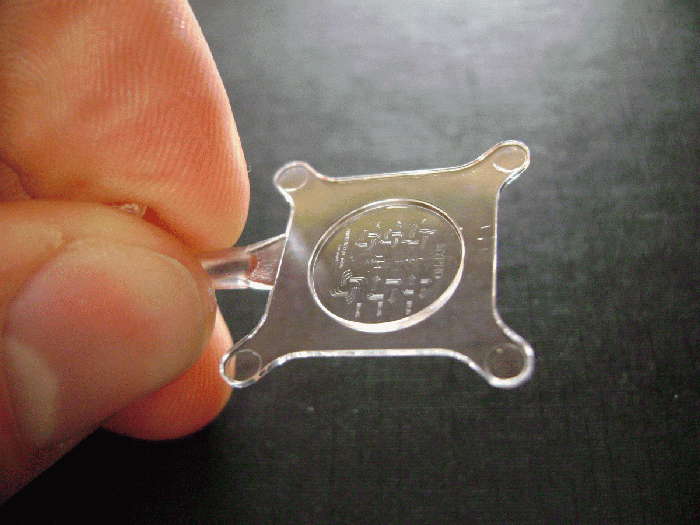Nypro runs four demos at NPE2012
Global precision plastic injection molder Nypro (Clinton, MA) is participating in four technology demonstrations at NPE 2012 (Orlando FL) this week. Four demonstrations at NPE are the most in recent memory for Nypro at
April 1, 2012
Global precision plastic injection molder Nypro (Clinton, MA) is participating in four technology demonstrations at NPE 2012 (Orlando FL) this week. Four demonstrations at NPE are the most in recent memory for Nypro at
|
Micro features on test component point the way for microfluidics. |
the big American show,which is held every three years. One reason is increasing emphasis on partnerships at the molder, Michael P. McGee, director of technology at Nypro, told Plastics Today in an interview. Another reason, McGee said, said was excitement about the show, which is being held in a new city and in a new time slot.
The demonstrations include:
Molding a component in the Arburg booth (3729) that has tens of thousands of measurable micro and sub micron geometric structures along with 18 controlled dimensions which were used to demonstrate capabilities in the sub-micron field. One of the partners is the University of Massachusetts Lowell Center for High-Rate Nanomanufacturing.
Production of a medical syringe made of Topas cyclic olefin copolymer (COC) in a Nypro mold in the Sodick Plustech (Schaumburg, IL) booth (363). The design of the "V-LINE" injection unit from Sodick Plustech eliminates the check valve, a primary source of material degradation and shot volume inconsistency. COC is replacing PVC and glass for syringes because of its purity and clarity. Nypro contributes precision toolmaking to the demonstration.
Mold-Masters will show its IRIS technology on the molding of a 0.5 mm thick, deep draw food packaging container in the JSW Plastics Machinery booth (463). This system has been integrated by Nypro with a mold designed and built by NyproMold. IRIS is a coinjection hot runner technology. Co-Injection in thin- wall containers eliminates the need to use a multi-layer thermoformed structure with tie layers and glues.
Participation in the booth (163) of Manner USA, a unit of the German Männer Group, which has developed a closed-loop 5-ton micro-molding system to produce gears. Nypro is one of the first American partners of Männer's newly developed micro molder.
McGee says that Nypro continues its commitment in supporting and directing advanced technologies at the UMass Lowell Center for High-Rate Nanomanufacturing by facilitating paths to commercialization. The smallest feature on the test part in the Arburg booth demonstration is 500 nanometers in width. The study on the micro-featured part has been taking place for over two years, and includes other partners such as Topas and Sabic.
"The purpose of the project is to provide proof of principle relative to tool fabrication, rheology and advancements in material science and advanced manufacturing," says McGee.
Other partnerships take various forms depending on the partners' region and technical expertise. "What they all share is new and emerging technologies which align to our customers' needs," said McGee. In addition to industry partners, Nypro has academic partnerships with more than a dozen institutions including UMass Lowell, Worcester Polytechnic Institute, A-Star in Singapore and Fraunhofer in Germany. These partnerships complement Nypro's existing internal expertise and extend its technical network on behalf of its customers.
In the old model of collaboration, research was licensed to industry following its completion. In the model that Nypro is pursuing, industry and academic researchers are collaborating from the outset.
NyproMold (booth 4263) announced that it is now using CT-scanning to produces fast, precise 3D representations of parts both internally and externally.
"We believe we are the only mold maker in North America to have this capability," said Bill Muldoon, president of NyproMold. "It provides detailed information on a part or assembly that was previously either unattainable or extremely difficult to obtain, and allows us to make decisions that allow us to build qualified molds faster than ever before."
CT scanning is a process that uses an x-ray scan to produce a complete highly accurate 3D representation of the component.
.
You May Also Like



